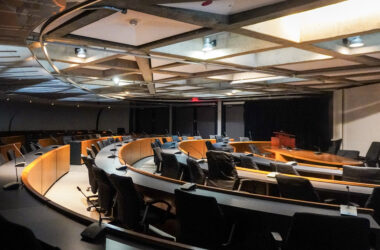McGill began the fall semester on Aug. 28 with its Law professors on strike. The Association of McGill Professors of Law (AMPL) first called the strike in April amidst a stalemate in their collective agreement (CA) negotiations with McGill. AMPL then decided to pause their strike in June when McGill agreed to new bargaining sessions in order to preserve strike funds and grade outstanding coursework. However, with the fall semester looming, the union resumed their strike on Aug. 26 to pressure McGill to cease challenging their status as a union before the courts and to return to the bargaining table before moving forward with arbitration.
The decision to recommence their strike comes after months of fruitless negotiations. Although the parties have settled many aspects of the CA, AMPL asserts that McGill has been unwilling to give up its authority to unilaterally change the terms of the contract after it has been signed. According to the union, this has been the main sticking point in negotiations.
In a public message to students, AMPL explained their decision to resume the strike.
“As the first faculty union in the history of McGill, we know that any negotiated change that constrains the administration’s discretion paves the way for improvements in working conditions not just for us, but for the entire campus. We now use the one method at our disposal—the right to strike—to change the dynamics of the bargaining process,” AMPL wrote.
Two bargaining sessions were scheduled to take place over the summer, the first on June 7, and the second on Aug. 19. However, after failing to make progress at the June 7 negotiations, McGill asked Minister of Labour Jean Boulet to submit the issue to an arbitrator, which would allow a neutral third party to resolve the agreement. On July 19, Boulet granted the university’s request, appointing Maître Allard.
“McGill looks forward to working with Maître Allard to resolve outstanding issues with AMPL and focusing on minimizing any impacts of the dispute on students,” the MRO wrote in a statement to The Tribune.
However, AMPL asked the Superior Court of Quebec to suspend Boulet’s decision, arguing that McGill’s pursuit of arbitration aimed to delay the CA’s resolution until a hearing in December where McGill will lobby for AMPL’s decertification. According to AMPL, a delay could have especially high stakes given that McGill has legally challenged AMPL’s right to strike and exist as a union since the Law professors first applied for certification in November 2021.
“If their suit is successful, it will gravely impede the ongoing efforts of professors in other faculties—Arts and Education—to certify their associations,” AMPL wrote in their public message to students. “[McGill] wants to drag out reaching a collective agreement with us to try to kill our union through its decertification proceedings.”
Despite AMPL’s concerns, the Superior Court of Quebec ultimately rejected their request to suspend the Ministry’s decision on Aug. 16.
Kirsten Anker, Vice-President of AMPL, urged McGill to cease challenging their union certification so both parties can willingly move to arbitration. She also questioned McGill’s reluctance to drop the lawsuit against the union.
“The question I’m asked all the time is: ‘What does the university hope to get out of this?’ And I can’t answer that question because […] we have the right to unionize. Apart from burning McGill’s good will with the public and burning our reputation, and disrupting an incredible amount of learning by students, I can’t see what purpose is served,” Anker said in an interview with The Tribune.
In a written statement to The Tribune, the McGill Media Relations Office (MRO) explained the university informed AMPL on Aug. 18 that they would not be attending the Aug. 19 bargaining session because they did not believe further conciliation meetings would yield any progress. However, Anker told The Tribune that AMPL believed both parties would move forward with the meetings, noting that one of the reasons the Superior Court of Quebec rejected the union’s request to suspend arbitration was that further negotiation sessions were scheduled to take place.
AMPL aims to place conditions on the arbitration process. First, they hope to submit the monetary aspects of the contract to arbitration and finish negotiating the non-monetary issues, which are largely resolved. Further, AMPL has agreed to end its strike if McGill stops litigating against them.
AMPL also claims that the university has been obstructing union activities by communicating with members of the union directly instead of contacting AMPL representatives in an effort to undermine the union’s credibility. On Aug. 26, the same day the strike began, AMPL filed a complaint with the Tribunal administratif du travail (TAT), noting that Robert Leckey, Dean of the Faculty of Law, had sent several emails to Law professors on behalf of Provost Christopher Manfredi and Vice-President (Administration and Finance) Fabrice Labeau, including one that questioned the union’s approach to negotiations. One such communication was sent shortly before AMPL’s union meeting, where they would vote on a strike mandate.
McGill was informed of the complaint on the day it was filed and was summoned to the court on Aug. 30. The night before the hearing, the university’s lawyers notified the court that McGill would not be able to attend and requested that the hearing be rescheduled. The court rejected McGill’s request that the hearing be suspended, noting that they did not give sufficient notice or provide an adequate excuse for their absence, but agreed to consider the evidence McGill’s attorney had transmitted. The TAT ultimately decided to issue a safeguard order, instructing McGill to “cease all forms of obstruction and to refrain from interfering in union affairs in any way whatsoever.”
The tension between AMPL and McGill has had tangible impacts on students. Jonah Kidd, 3L, told The Tribune that the strike could cause issues for international students with student visas, as well as graduating students and students enrolled in the one-year-long Master of Laws program. He also noted that the strike has serious financial implications for students paying tuition despite most or all of their courses being cancelled. Despite Kidd’s concerns, he stated his support for the strike and questioned the validity of McGill’s argument in their lawsuit against AMPL.
“While there’s definitely a short-term impact on students, there’s also a long-term impact, not only on professors, but on the students they teach if there’s no proper bargain made between AMPL and McGill,” Kidd said.
Other unions on campus have also expressed solidarity with the Law professors. The Association of Graduate Students Employed at McGill (AGSEM), the union which represents teaching assistants and invigilators, condemned McGill’s attempts to decertify AMPL and their pursuit of arbitration.
“McGill’s reasoning that too much time has elapsed between AMPL’s unionization and the creation of a collective agreement is unfair, as the delays have been largely due to McGill’s unwillingness to negotiate,” AGSEM wrote. “Further, McGill’s request for arbitration is completely inappropriate, seeing as how they have not put sufficient effort into bargaining themselves.”
AGSEM related that they had a similar experience negotiating with McGill when they bargained for their own CA earlier this year. They felt that the university did not take negotiations sincerely and claimed that McGill falsely interpreted the Labour Code to encourage lecturers, instructors, and faculty members to perform scab work while the TAs were on strike in April.
“We take issue with the employer’s callous interpretation of the Labour Code to gain advantage over its employees when this document is designed to allow fairness in a fundamentally unbalanced relationship between employee and employer,” AGSEM wrote. “As usual, we implore the employer to spend less time stalling and litigating and more time negotiating.”








